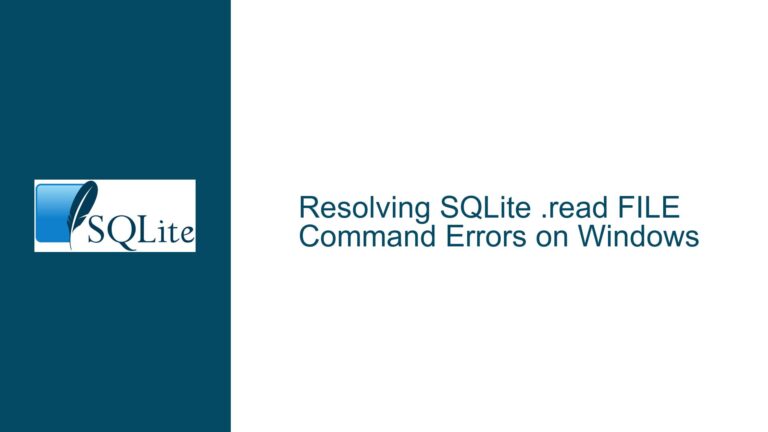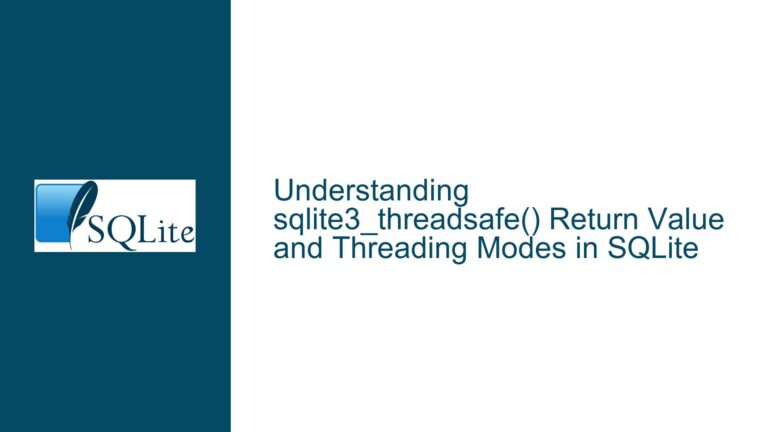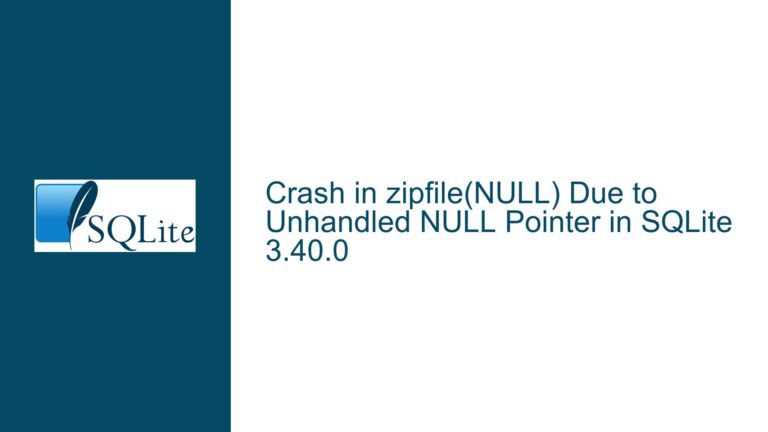Reintroducing OPFS-over-WASMFS Support: Safari 16.x Compatibility, Performance Trade-offs, and Build Constraints
Safari 16.x Compatibility and Cross-Browser Support Challenges
The reintroduction of OPFS-over-WASMFS support in SQLite’s WebAssembly (WASM) builds addresses a critical incompatibility with Safari 16.x while introducing cross-browser support nuances. Safari 16.x exhibits a bug in its implementation of the Origin Private File System (OPFS) storage API, which prevents the use of SQLite’s native OPFS Virtual File System (VFS). This bug, documented in WebKit’s issue tracker (Bug 255458), manifests as misbehavior in the storage API’s synchronization mechanisms, leading to data corruption or failed transactions. OPFS-over-WASMFS circumvents this by leveraging Emscripten’s WASMFS layer, which abstracts file system operations using a browser-agnostic approach. While this workaround enables Safari 16.x compatibility, it introduces dependencies on browser-specific behaviors. For instance, recent versions of Firefox and Chrome/Chromium handle WASMFS-based OPFS operations correctly, but older versions might exhibit inconsistencies due to evolving standards. Developers must also configure the Cross-Origin Opener Policy (COOP) and Cross-Origin Embedder Policy (COEP) HTTP response headers to enable SharedArrayBuffer support, a prerequisite for WASMFS. Failure to set these headers results in runtime errors during WASM module initialization. Testing across browsers is complicated by the fact that Safari 16.x remains untested in real-world scenarios, relying on theoretical compliance with Emscripten’s OPFS-over-WASMFS implementation. This creates a risk of undiscovered edge cases, particularly in hybrid desktop/mobile environments where Safari versions vary widely. Additionally, the lack of long-term stability guarantees for WASMFS complicates versioning strategies, as future Emscripten updates might alter OPFS integration semantics.
Performance Benefits vs. Concurrency and Locking Limitations
OPFS-over-WASMFS offers performance improvements over SQLite’s native OPFS VFS, primarily due to optimizations in synchronous I/O handling introduced in recent Emscripten versions. Benchmarks in controlled environments show reduced latency for read/write operations, especially in transaction-heavy workloads. These gains stem from WASMFS’s direct integration with browser-level OPFS APIs, bypassing intermediate layers in SQLite’s VFS stack. However, this performance comes at the cost of concurrency limitations. WASMFS enforces exclusive locks on opened files, preventing concurrent access to the same database from multiple browser tabs or worker threads. This exclusive locking mechanism arises from WASMFS’s lack of awareness about higher-level handle management, making it impossible to implement granular lock control within SQLite’s library. For example, if two tabs attempt to write to the same database simultaneously, the second tab will block indefinitely or throw an error, depending on the browser’s implementation. Applications requiring shared database access must implement custom locking logic at the application layer, such as using Web Locks API or coordinating via a service worker. The absence of WASMFS-exposed locking APIs further complicates this, as developers cannot directly query or manage file locks. Additionally, performance gains are not uniform across all operations. Large-scale batch inserts may benefit from WASMFS’s streamlined I/O, but transactional workloads requiring frequent lock acquisition/release could degrade due to contention. Developers must profile their specific use cases to determine whether the performance-concurrency trade-off is acceptable. For single-user, single-tab applications, this limitation is negligible, but multi-tab dashboards or collaborative tools face significant architectural hurdles.
Build Configuration and API Dependency Constraints
Adopting OPFS-over-WASMFS requires a custom SQLite WASM build, introducing platform-specific and toolchain-related constraints. The build process depends on Emscripten’s WASMFS, which is marked as a "work in progress," leading to potential breaking changes in future updates. This instability necessitates frequent rebuilds of the SQLite WASM artifact to align with Emscripten’s evolving APIs. Platform compatibility is another concern: ARM64-based systems, including Raspberry Pi 4 and many mobile devices, cannot execute WASMFS-enabled builds due to unresolved toolchain issues in Emscripten’s backend. Developers targeting these platforms must maintain separate build pipelines for OPFS-over-WASMFS and non-WASMFS artifacts. The requirement for ES6 modules further restricts integration into legacy systems relying on vanilla JavaScript or CommonJS modules. While modern frameworks like React or Angular natively support ES6, older codebases may require transpilation or wrapper modules, adding complexity to the build process. The COOP/COEP header mandate also impacts deployment configurations, as misconfigured servers will fail to load the WASM module. For instance, Apache or Nginx configurations must explicitly set these headers, and CDN providers might impose additional restrictions. Maintenance burdens arise from the decision to prioritize ES6 over vanilla JavaScript, as noted in the forum discussion. Although community demand for vanilla JS builds is low, organizations with strict content security policies (CSP) or non-module-based architectures face adoption barriers. Finally, the lack of npm package support for WASMFS-enabled builds complicates dependency management. While an npm entry could simplify distribution, it risks misleading developers about the build’s experimental status, necessitating clear documentation of Emscripten’s instability and platform limitations.
Troubleshooting Steps, Solutions, and Fixes
Resolving Safari 16.x Compatibility Issues
To mitigate Safari 16.x incompatibilities, first verify that the COOP and COEP headers are correctly configured. For Apache servers, add Header set Cross-Origin-Embedder-Policy "require-corp" and Header set Cross-Origin-Opener-Policy "same-origin" to .htaccess. In Nginx, include add_header Cross-Origin-Embedder-Policy "require-corp"; and add_header Cross-Origin-Opener-Policy "same-origin"; in the server block. Test header configuration using browser developer tools’ network tab, ensuring responses include these headers. For Safari-specific issues, implement feature detection by checking for navigator.storage.getDirectory() availability and fall back to non-OPFS storage if unsupported. Use try-catch blocks around database initialization to handle exceptions caused by missing APIs. If Safari 16.x still fails, consider user-agent sniffing (though discouraged) to display warnings or redirect to a compatible browser.
Optimizing Performance While Managing Concurrency
To leverage WASMFS performance gains without concurrency pitfalls, isolate database access to a single tab using BroadcastChannel API to coordinate cross-tab communication. For example, designate a "master" tab that handles all database operations, while other tabs send requests via postMessage(). Alternatively, use a SharedWorker to centralize database access, ensuring only one thread holds the WASMFS lock. Implement exponential backoff retries for transient lock contention, with timeouts to prevent deadlocks. For read-heavy applications, cache frequently accessed data in IndexedDB or memory to reduce lock acquisition frequency. Monitor performance using Emscripten’s --profiling flag and analyze Chrome DevTools’ Performance tab to identify bottlenecks. If transaction throughput plateaus due to locking, partition databases into smaller shards accessible independently.
Addressing Build and Platform Constraints
For ARM64 platform support, cross-compile the WASMFS-enabled build on an x86_64 host using Emscripten’s -m32 flag, though this may not resolve all compatibility issues. Alternatively, provide a non-WASMFS fallback build for ARM64 users, detected via navigator.userAgent or hardware concurrency APIs. To integrate ES6 modules into legacy systems, use Rollup or Webpack to bundle the WASM artifact into a UMD module. Configure transpilers like Babel to target ES5 while preserving WASM’s async initialization. For missing npm packages, create a private npm registry entry with a postinstall script that fetches the WASMFS build from a CDN. Document Emscripten version requirements explicitly, and pin dependencies to avoid unexpected breaks. If COOP/COEP headers cannot be set due to server constraints, use a proxy server or Cloudflare Worker to inject headers dynamically. For long-term maintenance, fork Emscripten’s repository and stabilize a specific commit hash, periodically merging upstream updates after regression testing.
This guide provides a comprehensive framework for diagnosing and resolving issues related to OPFS-over-WASMFS adoption, balancing immediate workarounds with strategic architectural decisions.






